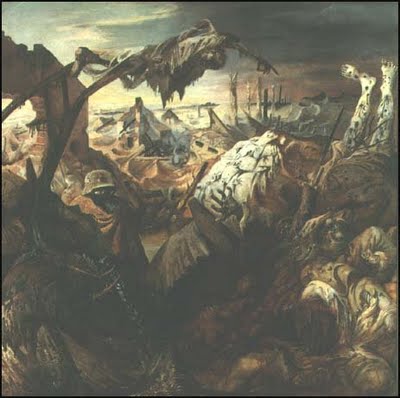 Otto Dix, Trench Warfare (1932)
Otto Dix, Trench Warfare (1932)
I have gained some new insights into The Lord of the Rings since my son Toby wrote an essay about it for the University of Pittsburgh’s graduate English program. Toby informs me that there are a number of debates around the book, especially whether it should be considered great literature.
The case against including it in the literary canon is that it is just popular fantasy fiction. Defenders, on the other hand, say that Tolkien should be put in the company of the modernists (like Pound and Eliot and Graves) because he deals with modernist themes, such as the emotional devastation of World War I and the dislocations of modern life.
And then there are those who claim not to be interested in judging Lord of the Rings but who just want to study it as a cultural phenomenon. Its enduring popularity and its influence on fantasy literature are enough to make it worthy of study, they say.
Whatever the case, academic interest is such that the journal Tolkien Studies has been in existence since 2004.
Toby is interested in the way the book helped Tolkien work through some of the issues raised by World War I. For me, his most interesting idea concerns the vagueness of the ring. Toby argues that confusion over exactly what the ring does and what it is capable of parallels confusion amongst World War I soldiers about why they were fighting.
You’ll appreciate the problems Toby finds with the ring if you’ve read the book. I quote from his essay:
“The ring’s power is possibly the most curiously unquestioned aspect of the entire series. When Boromir is overcome with greed for the ring’s power, it’s anybody’s guess as to what he plans to do with it if he could get it. The ring certainly doesn’t seem to help Isildur much when he’s killed in an orcish ambush. . . . Another possibility is that, as the rhyme carved into the ring suggests, its power centers on exerting influence on the other rings of power: “One Ring to rule them all, One Ring to find them,/One Ring to bring them all and in the darkness bind them” (50). Yet Sauron seems perfectly capable of controlling the Nazgûl without the ring, and even when he has the ring he is unable to find or control the Three Rings . . It’s also unlikely that the ring sustains Sauron and grants him his indefinite existence—as Tolkien writes in the Chronology of the Westlands, Sauron is already 1100 years old when he forges it. So we’re left with the somewhat curious possibility that the ring’s power is based completely on an appearance of power so magnificent that it can tempt absolutely anyone into abandoning his or her moral convictions.
Toby goes on to argue that the ring may be a McGuffin and that its actual value is “almost completely predicated upon its perceived value.” The term McGuffin, I believe, comes from Alfred Hitchcock, standing in for something that people want so badly that they will chase after it. Hitchcock didn’t care what it was, which he saw as irrelevant (the 39 steps, uranium ore, microfilm).
Toby doesn’t have problems that the ring is a McGuffin. Rather, he argues that “the existence of a seemingly arbitrary driving force behind world-shaking conflict” is also the situation of World War I. Many were confused over what exactly had caused it and why it went went on for as long as it did. Toby writes, “For England, perhaps more than any other nation, the will to fight seemed grounded in little more than a will to fight. This wasn’t a war for God, or civilization, or conquest; it was war because for some reason there had to be a war.”
In short, the ring has to be destroyed and World War I had to be fought because, well, because they had to be. It might not be clear how exactly destroying the ring will destroy Sauron or fighting the Battle of the Somme would end evil in the world. These were unexamined premises that people gave their lives to. In writing his book, Tolkien put his finger on a central uncertainty in the “Great War.”
I wonder, however, whether Tolkien, by telling a story of good triumphing over evil, actually perpetuates the illusion that sustained World War I. In this way his book would differ from, say, All Quiet on the Western Front, which explodes the myth. And if this is the case, then maybe the detractors are right—maybe Lord of the Rings really is a fantasy escape that fails to engage with the bigger issues.
To dramatically shift gears, it was certainly a fantasy escape when I turned to it in my adolescence. I’ll explore whether or not fantasy escapes are healthy in subsequent posts. And invite Toby to respond to this one.


2 Trackbacks
[…] comedy. And then, when World War I descends upon them, one of the characters turns to fantasy (as Tolkien would) for a refuge from the horrors of the […]
[…] The website that I used can be found here. […]